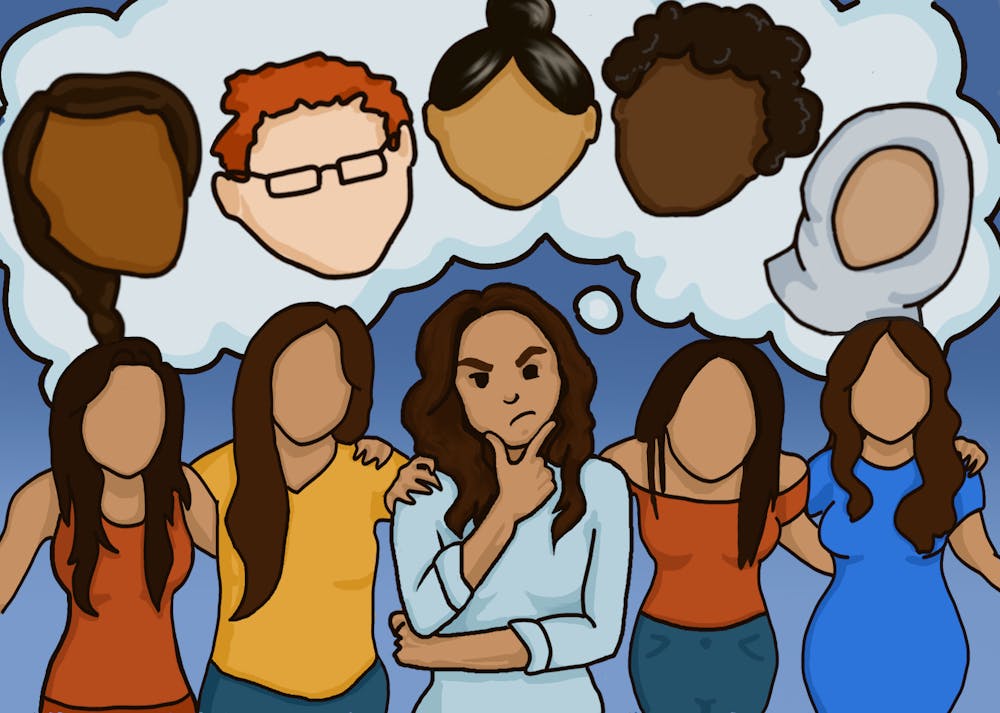When I first moved to ASU, I had a hard time calling it home.
As a student who came from a small Hispanic community in Casa Grande, I did not instantly connect with ASU. It wasn't until I found friends who shared my culture or came from a similar background that I finally felt more understood and connected to the community.
As of Fall 2020, 26.2% of undergraduate students at ASU were Hispanic or Latino, 4.3% were Black and 8% were Asian. Some students have a difficult time finding a friend group that they're familiar with. But some students have found friends or organizations that helped them find a home away from home.
Some students feel most connected to their roots when they are able to express themselves in the form of dance. Others feel most connected when they are able to talk about their cultural experiences in an open and understanding space.
Haley Lucero, a master’s student studying communication, said finding friends with similar backgrounds can help students feel more connected to their identities.
"We tend to surround ourselves with people who are like us because it helps us make sense of who we are," Lucero said.
Friendships like these help students reinforce and remember the things they value, care about and learned growing up, she said.
Style Ranger, a junior studying global management, said he found that staying engaged with his community and culture has helped him stay more motivated while at ASU.
Ranger is an active member of the fraternity Phi Beta Sigma, a Black fraternity at ASU. Joining the fraternity has helped Ranger form a deeper sense of identity because he no longer feels alone or out of place, he said.
"I wanted to be surrounded by people who look like me because I wanted it to motivate me," Ranger said. "Looking at them, I knew I could (succeed) too."
Ranger stayed in tune with his culture through strolling and stepping, a dance specific to Black Greek Life. This form of dance is typically performed in unison to symbolize unity and strength, he said.
The unique sounds and movements, along with the support from the other dancers, have helped him feel more connected with his culture.
Lucero said that interacting with people who have values different from oneself can highlight what makes each person unique, help understand different value systems and respect the differences in others.
"Differences make you start thinking about why you are the way you are," Lucero said.
Like many students, Maya Bahl, a senior studying community health, is grateful for the relationships she has had with friends inside and outside of her culture.
"I think they all help us grow differently because you get to see different perspectives," she said.
But there is something about having friends from her own culture that has helped Bahl get more in touch with herself and her community.
"(My friends) teach me a lot about my culture and I've grown more into my culture since I've been at ASU," Bahl said.
Bahl has found supportive friends through Andaaz, Arizona’s only competitive, coed Bollywood-fusion dance team. Bahl has been dancing since the age of 3 so she was grateful to continue that tradition when she moved to ASU.
"It created an outlet for me to continue that comfort (of home) in Arizona," Bahl said.
I myself have struggled with forming deeper relationships with people I could not relate to. I felt like an outsider as someone of Hispanic decent surrounded by non-Hispanic students downtown. That feeling of home didn't set for me until I reconnected with an old friend from high school who could share in my experiences.
My friend and I continuously discuss what it's like to feel out of place when we don't see our Latine culture being as present in the ASU community as it was in our hometown — how we feel unique, but at the same time alone.
Jansen Van Mallari, a sophomore studying business management, realized after leaving for college that his culture is part of what has made him unique. So he became a member of the cultural organization Philippine American Student Association (PASA) at ASU.
"That feeling of belonging is easy to gain within your own culture," Van Mallari said.
Van Mallari appreciates PASA being an open place for him to talk about his cultural experiences and about things that remind him of home. The organization has made it easier for him to form friendships because culture is usually a great conversation starter. It has allowed him to connect with complete strangers in a deeper sense, he said.
"Even if you haven't met these (club members) before, they'll share that same connection of culture and background and it's a great starting point," Van Mallari said.
Like other students, now that I have found ways to stay connected to my culture through my friendships, I can call ASU home.
Reach the reporter at agonz295@asu.edu and follow @adriana_gc_ on Twitter.
Like The State Press on Facebook and follow @statepress on Twitter.
Continue supporting student journalism and donate to The State Press today.




